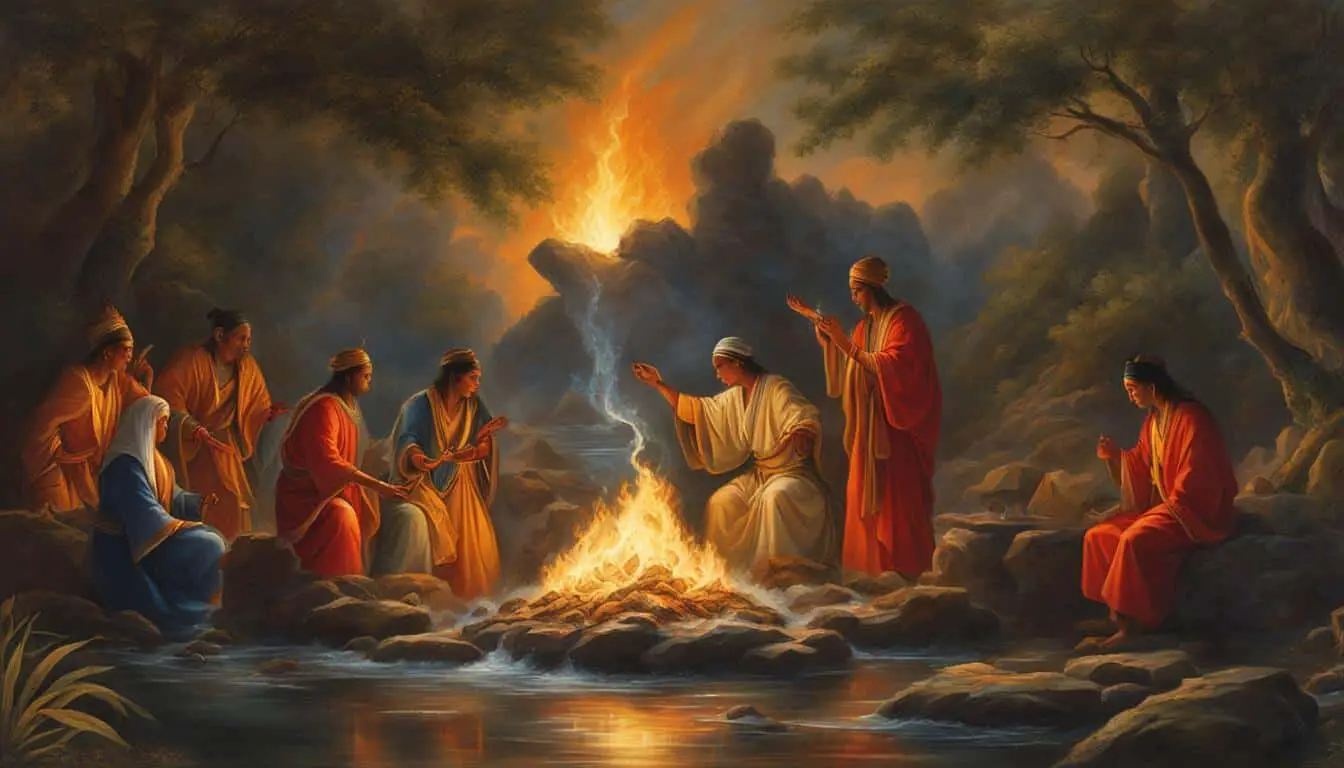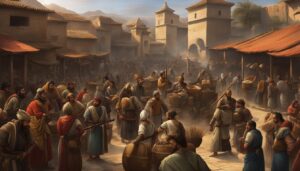
The study of rituals and ceremonies in biblical cultures is a fascinating area of research that provides insights into the religious and cultural practices of ancient civilizations. From the pilgrimage destinations associated with religious institutions to the rituals performed at shrines, these practices have evolved over time and continue to shape the worldview of believers. Understanding the role of power and leadership in ritual invention and performance is crucial in comprehending the significance of these traditions. By examining case studies from Roman Catholic shrines and prehistoric sites, we can gain a deeper understanding of the rituals and their societal impacts in biblical cultures.
Key Takeaways
- Rituals and ceremonies in biblical cultures offer insights into ancient religious and cultural practices.
- Pilgrimage destinations and shrines play a significant role in these rituals.
- Understanding the role of power and leadership is crucial in comprehending the significance of rituals.
- Comparative studies between Roman Catholic shrines and prehistoric sites provide valuable insights.
- Exploring the rituals and their societal impacts enhances our understanding of biblical cultures.
Rituals and Traditions at Lourdes: The Invention of Place, Routes, and Rituals
Lourdes, a small town in France, holds great significance as a Roman Catholic shrine and a popular pilgrimage destination. Its importance stems from the visions experienced by Bernadette Soubirous in 1858, which led to the establishment of a sanctuary around the grotto where the visions occurred. Today, Lourdes attracts millions of visitors annually, who come to seek spiritual healing and participate in the sacred rituals of the shrine.
At Lourdes, several rituals have evolved over time to accommodate the increasing number of pilgrims. One significant ritual is the Blessed Sacrament ceremony, where the Eucharist is carried in a monstrance and displayed to the faithful. This collective ritual reinforces the presence of the divine in the midst of believers and serves as a moment of reverence and devotion. The Torchlight Procession, another important ritual, involves pilgrims carrying lit candles as they walk in procession, symbolizing their faith and unity.
These rituals play a vital role in the pilgrims’ journey to Lourdes and at the shrine itself. They are carefully orchestrated by leaders and guides, highlighting the influence of power and authority in the invention and performance of rituals. The leaders guide the pilgrims through prescribed routes, ensuring that they experience the designated rituals in a specific order. Through these rituals, the pilgrims engage with the sacred and connect with the spiritual heritage of Lourdes.
| Ritual | Description |
|---|---|
| Blessed Sacrament Ceremony | A collective ritual where the Eucharist is displayed to the faithful in a monstrance, symbolizing the presence of the divine. |
| Torchlight Procession | A ritual where pilgrims carry lit candles and walk in procession, symbolizing their faith and unity. |
| Hydrotherapy | A ritual involving bathing in the waters of the Lourdes spring, believed to have healing properties. |
| Confession | A ritual where pilgrims confess their sins and seek forgiveness, experiencing spiritual renewal. |
As the rituals at Lourdes continue to evolve, they reflect the changing needs and expectations of the pilgrimage experience. These collective rituals not only provide a sense of belonging and community for the pilgrims but also foster a deeper connection to their faith. Moreover, the influence of power and leadership in the invention and performance of rituals highlights the role of religious authorities in shaping the pilgrims’ spiritual experiences. Through these rituals, Lourdes remains a beacon of hope and inspiration for believers from around the world.
The Field of Comparative Theology and its Relevance to Rituals in Biblical Cultures
Comparative theology is an emerging field that explores the similarities and differences between religious traditions. As a theological discipline, it seeks to understand the beliefs, practices, and rituals of various traditions. In the context of rituals in biblical cultures, comparative theology can provide valuable insights into the rituals and ceremonies performed by different religious groups.
By examining the practices within and across traditions, comparative theology offers a deeper understanding of the significance and cultural context of these rituals. It allows us to analyze the commonalities and variations in the ways different religious groups approach and engage with their rituals. Through this interdisciplinary approach, we can shed light on the historical, social, and theological factors that contribute to the development and evolution of these rituals.
Furthermore, comparative theology encourages constructive dialogue between different religious communities, fostering mutual respect and understanding. By engaging in comparative theological study of rituals in biblical cultures, we can promote interfaith dialogue and collaboration, ultimately contributing to a more inclusive and harmonious society.
While the field of comparative theology is still evolving, its potential in understanding rituals in biblical cultures is immense. Further exploration and research in this area will help us uncover new insights into the rich tapestry of religious traditions and their practices, deepening our appreciation for the diversity and complexity of human spirituality.
FAQ
What is the significance of studying rituals and ceremonies in biblical cultures?
Studying rituals and ceremonies in biblical cultures provides insights into the religious and cultural practices of ancient civilizations, helping us understand their worldview and beliefs.
How have the rituals at Lourdes evolved over time?
The rituals at Lourdes, such as the Blessed Sacrament ceremony and the Torchlight Procession, have evolved to accommodate the growing number of pilgrims visiting the Roman Catholic shrine. These rituals reflect the changes in the pilgrimage experience and the role of power and authority in their performance.
What is comparative theology, and how does it relate to rituals in biblical cultures?
Comparative theology is a theological discipline that explores the similarities and differences between religious traditions. By examining the practices within and across traditions, comparative theology offers a deeper understanding of the significance and cultural context of rituals in biblical cultures.








